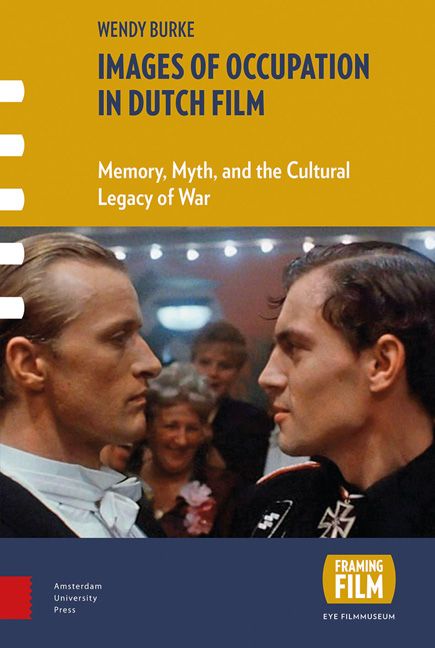Book contents
- Frontmatter
- Contents
- Acknowledgements
- Note on Translations
- List of Illustrations
- Dedication
- Introduction
- Chapter 1 Representation, Occupation, and Dutch War Films
- Chapter 2 The Image of the Enemy
- Chapter 3 Dutch Identity and ‘Dutchness’
- Chapter 4 Life Under Occupation
- Chapter 5 Resistance and Collaboration
- Conclusion
- Notes
- Filmography
- Bibliography
- Glossary of Dutch and German Terms
- Appendix Top dutch films by box office admissions
- Index
Chapter 1 - Representation, Occupation, and Dutch War Films
Published online by Cambridge University Press: 11 December 2020
- Frontmatter
- Contents
- Acknowledgements
- Note on Translations
- List of Illustrations
- Dedication
- Introduction
- Chapter 1 Representation, Occupation, and Dutch War Films
- Chapter 2 The Image of the Enemy
- Chapter 3 Dutch Identity and ‘Dutchness’
- Chapter 4 Life Under Occupation
- Chapter 5 Resistance and Collaboration
- Conclusion
- Notes
- Filmography
- Bibliography
- Glossary of Dutch and German Terms
- Appendix Top dutch films by box office admissions
- Index
Summary
What we, or at any rate what I, refer to confidently as memory—meaning a moment, a scene, a fact that has been subjected to a fixative and thereby rescued from oblivion—is really a form of storytelling that goes on continually in the mind and often changes with the telling. […] In any case, in talking about the past we lie with every breath we draw.
William Maxwell, So Long, See you Tomorrow (1996: 27)This opening chapter acquaints readers with a background to the key areas of representing the past, nationhood and identity, the re-writing of history, and myth and memory in film—including mythologizing war in popular cultural memory. These form a basis for my in-depth readings of Dutch films about the occupation in the following chapters. In this chapter I also provide the historical background to the Netherlands’ experience during World War Two and assess the German occupation of the Netherlands between 1940 and 1945. Post-war consequences and the legacy of the occupation are also examined. I then give an overview of Dutch film history, followed by a closer look at Dutch feature films specifically about the war and occupation from both a historical and a cultural perspective.
Representation in the context of this book means a re-presenting of events, historical eras, and people within popular cultural products—in my case, Dutch feature films about the war. Cultural representations can never actually be what they try to represent or imitate: the films I examine throughout this book can never fully recapture ‘reality’ nor accurately copy real-life events, as those moments in time have long gone. I am interested instead in why films as cultural representations are created in particular ways, especially across the decades of the 1960s to the 1980s. In this way, images of the occupation in Dutch films become social constructs—versions of the histories, events, and characters of that 1940-1945 period—mediated through the prism of certain cultural, societal, and ideological codes from the time they were produced.
This sociology of representation in the context of this book looks closely at images of occupation in Dutch films to help us understand what these films might tell us about the times in which they were made.
- Type
- Chapter
- Information
- Images of Occupation in Dutch FilmMemory, Myth and the Cultural Legacy of War, pp. 23 - 68Publisher: Amsterdam University PressPrint publication year: 2017



